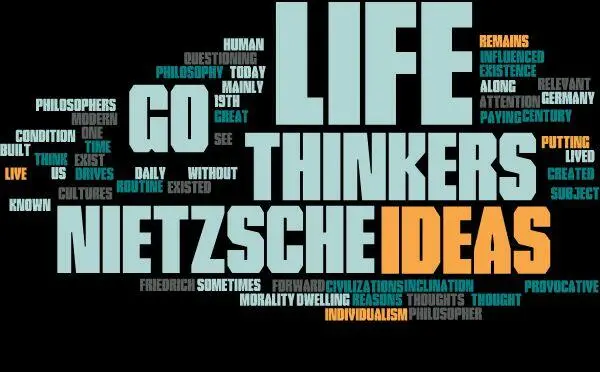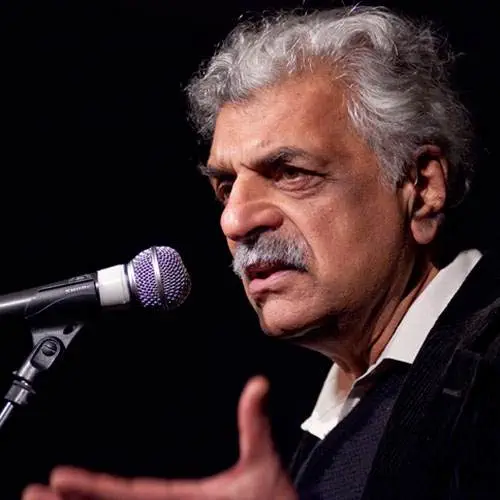 We go through life without paying attention to what drives us to live, exist, and follow our daily routines. Thinkers who had the time and inclination to think about life and existence have created the subject of Philosophy. Great thinkers have existed in civilizations and cultures, putting forward their thoughts and reasons, and sometimes questioning life as we see it. Friedrich Nietzsche was one such philosopher. He lived in 19th-century Germany. He is known for his provocative ideas that influenced modern thought. Other philosophers built on his ideas.
We go through life without paying attention to what drives us to live, exist, and follow our daily routines. Thinkers who had the time and inclination to think about life and existence have created the subject of Philosophy. Great thinkers have existed in civilizations and cultures, putting forward their thoughts and reasons, and sometimes questioning life as we see it. Friedrich Nietzsche was one such philosopher. He lived in 19th-century Germany. He is known for his provocative ideas that influenced modern thought. Other philosophers built on his ideas.
Nietzsche remains relevant today, focusing mainly on individualism, morality, and the human condition. His interpretations of traditional morality, religion, and societal norms resonate in a world where people seek personal freedom, self-expression, and purpose beyond inherited values. Here are 10 things about Nietzsche’s thoughts that can impact our lives:
1. The Will to Power (Übermensch concept)
 One day, Bob, a mild-mannered office worker, decided he was tired of being just another cog in the corporate machine. Inspired by his newfound love for philosophy (after reading exactly three pages of Thus Spoke Zarathustra), he declared: “I shall overcome! I will impose my Will to Power upon this soulless bureaucracy!”
One day, Bob, a mild-mannered office worker, decided he was tired of being just another cog in the corporate machine. Inspired by his newfound love for philosophy (after reading exactly three pages of Thus Spoke Zarathustra), he declared: “I shall overcome! I will impose my Will to Power upon this soulless bureaucracy!”
His first act? Taking the best parking spot, reserved for the regional manager. He strode into the office with newfound confidence, ignoring all passive-aggressive emails about “unauthorized vehicle placement.”
Next, he rebelled against the tyranny of decaf coffee, replacing the entire breakroom supply with triple-shot espresso pods.
Productivity soared; so did heart palpitations.
Bob abolished unnecessary meetings for his final act by simply not showing up. When questioned by Human Resources, he quoted Nietzsche:
“He who cannot obey himself will be commanded.”
Human Resources was not amused. Bob was promoted not to manager but to working from home indefinitely.
Some say he achieved Übermensch status (The Over Man or Superman). Others say he’s just freelancing now. Either way, Bob lived out his Will to Power … for a glorious three weeks!
The will to power
The will to power is about empowering oneself. Nietzsche believed that life is driven by an innate desire for self-overcoming and the pursuit of excellence. This concept encourages us to strive for greatness. This is one of his most influential and debated ideas. It stands for a fundamental force driving all life, a primal instinct not merely for survival but for growth, dominance, and self-overcoming. It is not about mere existence, Nietzsche’s Will to Power is about striving, creativity, and mastery—a dynamic force that compels individuals to assert themselves, reshape their world, and transcend limitations.
He saw this as the essence of existence, manifesting in everything from biological evolution to artistic creation and political ambition. He believed traditional morality and religious doctrines suppress this will, promoting weakness instead of strength. The Übermensch (Overman), his ideal figure, embodies the Will to Power by rejecting imposed values, forging their own path, and overcoming societal constraints.
The Will to Power is not about brute dominance but self-transformation—the drive to create, affirm, and define meaning in an otherwise indifferent universe. In this context, Nietzsche was critical of any view that rejects generally accepted aspects of human existence, like knowledge, morality, or meaning. His call was for humanity to rise above stagnation. Ultimately creative force was behind all great human achievements.1
2. The Death of God (Nietzsche’s radical ideas)
 “God is dead.” – Nietzsche
“God is dead.” – Nietzsche
“Nietzsche is dead.” – God
Some say God got the last word.
Others say Nietzsche just needed a better Public Relations team!
Nietzsche’s famous declaration that “God is dead” symbolizes the decline of traditional morality and the rise of individual responsibility. This idea challenges us to create our own values. 2 Nietzsche’s famous proclamation “God is dead” is not a literal claim but a figure of speech for the decline of religious belief in modern society. However, Nietzsche did not celebrate the decline in belief, he warned that without God, society faced a crisis of meaning, leading to a life that seems directionless and devoid of purpose.
He urged humanity to respond by creating new values, rather than clinging to outdated moral systems. His concept of the Übermensch (Overman) stands for the individual who overcomes the rejection of all religious and moral principles in the belief life is meaningless, by forging their own meaning. The warning is still relevant today as people grapple with existential uncertainty, seeking purpose beyond inherited traditions. His challenge: If God is dead, what will we build in His place?
3. Eternal Recurrence Explained
 Ever had that feeling of déjà vu?
Ever had that feeling of déjà vu?
Nietzsche would say, “Get used to it.”
Nietzsche’s concept of eternal recurrence puts forward the idea that all events in the universe will recur infinitely. This idea encourages us to live our lives with purpose and intention. Nietzsche’s concept of eternal recurrence is a thought experiment. It asks: What if you had to relive your life, exactly as it is, forever? Every joy, mistake, and regret—repeated endlessly. 3
This is not a claim about reality but a test of one’s attitude toward life. If the idea fills you with dread, you are living in denial of your own existence. But if you embrace it, you affirm life fully, without escape or regret. The ideal person—the Übermensch—lives as if they would gladly repeat every moment. Eternal recurrence challenges us to live deliberately, making choices we can own eternally. It’s a call to radical self-acceptance and responsibility. Whether or not the universe loops forever, the question is still: Would you say “yes” to living your life, exactly as it is, for eternity? Nietzsche’s eternal recurrence is like being stuck in a never-ending Zoom meeting—except you chose every decision that got you there.
4. Seeing Truth from Different Angles:
A philosopher, a scientist, and an artist walk into a bar. They all stare at a glass of water. The scientist says, “It’s H₂O.”
The artist says, “It’s a masterpiece of transparency.”
The philosopher strokes his beard and asks, “But is it really there, or is it just a construct of our perception?”
The bartender sighs, “It’s $5.50.”
This captures Nietzsche’s Perspectivism—the idea that truth isn’t absolute but shaped by different viewpoints. Just like how each person in the joke sees the glass differently, our knowledge is influenced by our experiences, biases, and beliefs. Perspectivism encourages us to question assumptions and consider multiple perspectives, making us more open-minded. After all, truth isn’t a rigid fact—it’s more like a kaleidoscope, shifting depending on how you look at it. 4 Nietzsche argued that all knowledge and truth is relative and subjective. It reminds us to consider multiple perspectives and challenge our own assumptions.
5. The Übermensch: Becoming Your Own Hero
 A man walks into a gym and tells the trainer, “I want to be the Übermensch.”
A man walks into a gym and tells the trainer, “I want to be the Übermensch.”
The trainer nods, “Great! Here’s a workout plan.”
The man looks confused. “Wait… I thought it was more about philosophy?”
The trainer sighs, “It is—but first, let’s work on those weak convictions.”
Superman flies, Spiderman swings, but Nietzsche’s Übermensch (superhuman)? He creates his own rules and values, transcending the ordinary to become his best self. Superhuman is not about superpowers but self-overcoming — rising above societal expectations to define life on your own terms. Think of it as being a better person looking beyond your current situation. Nietzsche reminds us that life isn’t about conforming to pre-made molds. Instead of following outdated scripts, we should rewrite our own stories—preferably with plot twists that keep life interesting. 5
6. Critique of Traditional Morality: The Great Rulebook Rethink
 Moral philosopher: “You must always tell the truth!”
Moral philosopher: “You must always tell the truth!”
Nietzsche: “What if the truth is boring?”
Moral philosopher: “Lying is wrong.”
Nietzsche: “So is wearing socks with sandals, yet here we are.”
Nietzsche argued that traditional morality, especially concepts like absolute good and evil, was invented to control people rather than uplift them. Instead of blindly following rules, he urged us to question morality’s origins and decide what’s meaningful for ourselves. 6
This doesn’t mean morality is meaningless, it means we should critically examine the rules we follow. After all, some rules, like “Don’t run with scissors,” make sense. Others, like “Thou shalt always be polite to people who cut in line,” deserve a second thought.
7. The Importance of Emotions: Feelings Matter (Even for Philosophers)
 Nietzsche: “Embrace your emotions!”
Nietzsche: “Embrace your emotions!”
Stoic: [Suppressing a tear] “I’m fine.”
Nietzsche believed that emotions weren’t weaknesses—they were central to shaping our experiences and values. Joy, anger, sadness, these aren’t distractions but essential parts of what makes us human. Quite contrary to stoicism, which teaches the development of self-control and fortitude as a means of overcoming destructive emotions; becoming a clear and unbiased thinker allows one to understand the universal reason.
Rather than suppressing feelings, Nietzsche urged us to use them as a guide. Passion fuels ambition, anger sparks change, and sadness reminds us of what truly matters. So next time someone tells you to “just be rational,” remind them that even philosophers have feelings—Nietzsche just expressed his, a bit more dramatically. 7
8. The Role of Art in Life: Beauty Beyond the Boring
Nietzsche: “Without art, life would be unbearable.”
Math teacher: “Without math, life would be illogical.”
Nietzsche: “And without coffee, life would be impossible.”
For Nietzsche, art wasn’t just decoration, it was life’s saving grace. He saw it to rise above the dullness of existence, infusing meaning into a world that often feels chaotic. Art isn’t just about pretty paintings; it’s about expressing ourselves and shaping the world through creativity. Whether it’s music, literature, or interpretive dance in your living room, art lets us create our own meaning. So, if life ever feels overwhelming, try turning it into a masterpiece—paint, write, or just dramatically stare out a window like a tragic poet. 8
9. The Need for Self-Reflection: The Mirror of the Mind
 Self-reflection is like updating your phone’s software—you don’t have to do it, but if you don’t, things might crash at the worst moment.
Self-reflection is like updating your phone’s software—you don’t have to do it, but if you don’t, things might crash at the worst moment.
Nietzsche believed that true growth requires deep introspection. Instead of going through life on autopilot, he encouraged us to question our beliefs, examine our actions, and constantly evolve. Taking time to reflect helps us understand our true selves, find outdated ideas, and become stronger, more independent thinkers. Just don’t overdo it—staring too long into the abyss might make the abyss stare back (which is Nietzsche’s way of saying, “Don’t get lost in overthinking”). 9
10. The Emphasis on Individualism: Be Your Own Authority (Philosophy of individualism)
 Friend: “But everyone else is doing it!”
Friend: “But everyone else is doing it!”
Nietzsche: “And everyone else is also miserable.”
Nietzsche’s philosophy champions individualism and self-reliance. Instead of looking for external validation, we should take charge of our own lives, define success on our own terms, and avoid blindly following the crowd. Being an individual doesn’t mean rejecting society; it means not letting it dictate your every move. The world loves conformity, but the most interesting people, the ones who shape history—are those who dare to think for themselves. Nietzsche’s advice? Create your own path and make it extraordinary10.
References
- Nietzsche, Friedrich. The Will to Power. Translated by Walter Kaufmann and R. J. Hollingdale, edited by Walter Kaufmann, Vintage Books, 1968.
- The Gay Science and Thus Spoke Zarathustra. God Is Dead and We Killed Him (Explaining Nietzsche) – Philosophy Buzz.
- Eternal Recurrence: What Did Nietzsche Really Mean? | Philosophy Break.
- Nietzsche’s Perspectivism: What Does ‘Objective Truth’ Really Mean? | Philosophy Break
- Nietzsche’s Perspectivism: What Does ‘Objective Truth’ Really Mean? | Philosophy Break
- Nietzsche’s Radical Challenge to Conventional Morality and Belief • Philosophy Institute
- Nietzsche’s Radical Challenge to Conventional Morality and Belief • Philosophy Institute
- What does Nietzsche say about art? – WisdomShort.com
- Nietzsche, Friedrich. The Will to Power. Translated by Walter Kaufmann and R. J. Hollingdale, edited by Walter Kaufmann, Vintage Books, 1968.
- Nietzsche’s Philosophy, The Road to Individual Freedom | by Stefan | Medium







